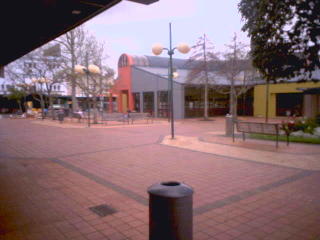Wednesday 28 Sept - Postmodern f(r)ictions

A slightly more prosaic choice of classroom venue today: the Pt. Chevalier public library. Marie's day off from work, too much rain, no chance to walk but a chance for us both to study.
I don't know where the stereotype of libraries being quiet places came from... what with the slightly deaf old lady catching up loudly with the librarian, to the annoying squeak coming from the revolving newspaper rack (which Marie eventually picked up and moved), to the general clatter of conversation. Methinks Pt Chev needs another pub, one with books!
Anyway, I got to read chapter 7 of The Writing Experiment, and discover (or have defined for me) Postmodernist fiction.
It was quite an appropriate chapter to read, after McKee's previous chapter on Act design. McKee is great, because he's going by what's proven, tried and tested. The Writing Experiment, on the other hand, is always about testing the boundaries, taking the path less traveled. Both approaches have their merits.
So, getting started, what characterises postmodernist fiction?
- questions the concept of "plot"
- subverts the notion of three-dimensional "real" characters, sometimes making them just caricatures.
- uses allegory, fantasy and new worlds to escape from - or enlarge on - realist writing and the "straitjacket" or representation.
- "the death of the author" - writing is no longer about the single author, coming from multiple sources, whether that's a collective of writers or just many sources (like found writing, or different non-literary genres).
Anyway...
PLOT
The traditional idea is what we've been learning about in Story: it hinges on rising and falling action.
The oldest model for plot is the Freytag pyramid. A modern narratologist would define a plot as a sequence of events, causal links, arousal of expectations with various alternative outcomes. Kind of sucks the life out of it, that kind of definition.
Interesting quote from the book:
"Used too tightly, [plot] can stifle digression, open-endedness, philosophical rumination, symbolic significance and generic variety (??). It may also result in an unnecessary emphasis towards catastrophic events, rather than significant, small-scale ones."
As I'm learning from Story, that ain't necessarily so. The structure may sound over-dramatic, but can be applied to the very commonplace things in life successfully. I remember a short film I saw once (very long ago) about a man walking to work, unconsciously racing the people he's walking with. When he 'loses', he complains and they're all surprised that he had this race thing in his mind. Anyway...
Writing offers some ways to subvert the idea of plot:
- raising but not fulfilling expectations
- raising non-specific expectations
- over-determined plot
- conflicting storylines - they make us see the other side of the story
This is the kind of thing that you can't really do in film, or even really on radio (though you could try). It's one of the advantages of the book genre.
You could use nonhuman characters to "highlight the blindness and prejudice of anthropocentricity." (!) Life from a banana's point of view could be quite interesting!
Or you could deliberately choose characters who have been marginalised because of race, gender, sexuality, disability, etc. It's a dangerous game to take on the voice of one of these people if you are not one of these people. ("One of these people"! Sounds terrible)
"You are always implicated in your own cultural context," warns the book. "If you are a westerner trying to write from a non-Western perspective, it may be impossible for you to totally bridge the gap." What does this mean for my idea of a science fiction novel set in the future where the main drivers are Chinese, Indian and African? ;)
Then there's historiographic metafiction (rewriting the past) and fantasy (creating new worlds). "Creating new worlds defamiliarises our own, making us see it afresh."
Creating a whole new world lets us ask questions, because there are no assumptions.
- is it close or distant in time from our own time? Or is it a mixture - castles and chariots with radios and cellphones?
- physical composition of world - like ours? Different gravity? What do people look like?
- religion - is there any? What do people generally believe in this world? Is it universal like Catholicism was during the Middle Ages, or is it pluralistic like today, where people believe all sorts of things.
- Political, economic organisation? Is it a totalitarian state? A representative democracy? Or is it a futuristic total democracy, where technology and education allows everyone to vote on every issue?
- Gender roles?
- Ethical basis of society? Is it okay to kill? When?
- New words and concepts - George Orwell's 1984 was full of words similar to our own, but with new meanings
- Topography, location?
- Narration, focalisation - whose point of view are you taking?



0 Comments:
Post a Comment
<< Home